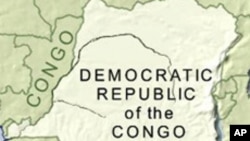A report from an independent group of experts on the Democratic Republic of Congo has found that military operations intended to dismantle the Democratic Forces for the Liberation of Rwanda, or FDLR, have been unsuccessful and that the rebels have regrouped in several locations in the eastern DRC. The panel also presented on Monday evidence that the rebels are funding their fight with millions of dollars from the exploitation of the country's gold and tin resources.
The nearly 300-page report, commissioned by the U.N. Security Council sanctions committee on the DRC, says the FDLR is continuing to recruit new fighters in parts of the county's Kivus region and is regrouping - despite military efforts to disband them.
The panel also named one unit of the DRC army that it says has been involved in supplying significant amounts of military equipment to the FDLR, before and after the army began operations, known as Kimia II, against the group.
Panel coordinator Dinesh Mahtani told reporters that the panel also found evidence that the FDLR is receiving support from within Congo's national army as well as from regional and international support networks.
Mahtani said the FDLR has a far-reaching international diaspora network that helps with the daily running of the movement, coordinates its military and arms trafficking, and manages its financial activities.
"These international networks have somewhat been over looked, hopefully until now," said Dinesh Mahtani.
The report also details how the FDLR is involved in gold smuggling. It says FDLR gold networks are tightly intertwined with trading networks operating within Uganda and Burundi as well as in the United Arab Emirates.
The panel also examined the activities of the National Congress for the Defense of the People, or CNDP, which was led by Laurent Nkunda until his arrest in January. While that group has officially been integrated into the national army, Mahtani says it still has heavy weapons from before its integration and that it continues to operate as a rebel group.
"They have changed uniforms, but they have retained a parallel system of chain of command, of illegal taxation, rackets that they are imposing on the ground," said Mahtani. "And they are also deeply involved in the exploitation of mineral resources as well."
The report says the CNDP remains a singular force on the ground and represents a threat to stability in the region given its poor level of integration into the national army.
The report also lists several commanders who it says are responsible for massacres, child recruitment, sexual violence and other serious crimes. The panel stresses the need for security sector reform and urges the U.N. Security Council to request that DRC authorities adopt legislation to create a vetting mechanism for its troops.
The future of the U.N. peacekeeping mission in the DRC is under review in the Security Council. With some 17,000 personnel, it is the U.N.'s largest mission. It has been in the DRC for the past 10 years and there are questions as to whether the mission should continue to support the army in its efforts against the FDLR.
Diplomats say another dilemma comes from DRC President Joseph Kabila, who would like to see peacekeepers begin leaving his country as early as next June, when the country celebrates the 50th anniversary of its independence from Belgium.
News
UN Experts: FDLR, CNDP Still Operating as Rebel Groups in DRC; Exploiting Minerals

A report from an independent group of experts on the Democratic Republic of Congo has found that military operations intended to dismantle the Democratic Forces for the Liberation of Rwanda, or FDLR, have been unsuccessful and that the rebels have regrouped in several locations in the eastern DRC. The panel also presented on Monday evidence that the rebels are funding their fight with millions of dollars from the exploitation of the country's gold and tin resources.



